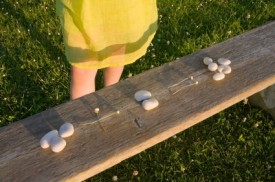
Every year, educators work hard to help their students learn as much as possible, squeezing in all the high-value knowledge they can. But come summer vacation, a solid percentage of that learning is lost as students walk away from school and get anywhere from six to twelve weeks to forget about the pressures of school and just go and be kids.
So, what can we do to minimize summer brain drain while still giving kids the break they need?
Since most kids backslide in math more than they do in reading (2.6 months of grade level equivalency, on average [i]), many parents welcome ideas for keeping math skills afloat without drowning the summer spirit. Fortunately, with a little creativity, fun opportunities to practice math skills abound.
Look for ways to incorporate math into everyday activities. Let your child pay with cash at the store. Or have your child figure out the tip at a restaurant – without a calculator. Include your child in figuring out how much fabric you need to make curtains. Bake together—and double the recipe, or halve it, letting your child figure out what the new measurements are for each ingredient.
If your child enjoys reading, add some math books to her summer reading list. Your middle or high school student might enjoy the classic Flatland, a story that takes place entirely in two physical dimensions. If you have an advanced math learner on your hands, she might be willing to give The Manga Guide to Calculusa try. (There are additional Manga titles on Physics, Statistics, Molecular Biology, and other advanced subjects.) Learners in middle school or the upper elementary grades may be interested in Math Curse. Math Fablesis good for very young children (K – 1), while The Grapes of Mathis more appropriate for ages 6 – 10 and Math Potatoesfor grades 3-6.
For the child who loves computer games, Math Playgroundis a web site with free multimedia math games for elementary through middle school students. The games on Math Playground are not indexed by grade level and the site features a lot of advertising, but the games are free & reasonably entertaining. In MathHoops, kids can solve word problems for a chance to shoot some hoops (this game does specify grades 3 - 5). There’s a “need help” button for tips on how to translate the word problem into math steps (e.g., “key words like ‘more’ tell you to add”).
The X Detectiveslets kids play secret agent, driving around a training compound in the “X-mobile” to work on skills in four different locations, such as negative numbers in the Integer Room and algebra puzzles in the Gadget Shop. Party Designerrequires kids to use algebraic reasoning to design a party floor plan.
As Thomas Haller and Chick Moorman note in their article Summer Brain Drain: Tips to Help Your Child Avoid Summer Brain Drain, the key is balancing learning with fun. They suggest a multitude of ways to practice academic skills while enjoying summer recreational activities. Be sure to check out the article for ideas about how to incorporate math while playing in the pool, taking a road trip, playing card games, and collecting money for charity. Perhaps the best advice is to model learning for your child by turning off the TV or video games and picking up a book or taking an art class. Even if your kids don’t avoid the summer brain drain – you will!
If you enjoyed this post on avoiding the Summer Brain Drain, be sure to sign upto receive future posts in your inbox and be sure to catch Part 2 later this month!
Related Reading:
Fun Science Experiments for Classroom or Home
Fit Bodies Make Fit Brains: Physical Exercise and Brain Cells
[i]Strauss, Valerie. Active Summer, Active Minds: Educators Seek Ways to Prevent Learning Losses During Vacation. Monday, June 15, 2009.

